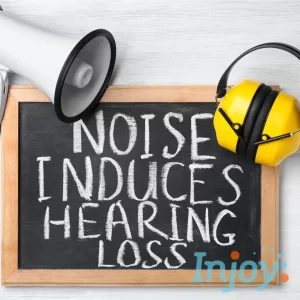
Sennheiser All Day Clear vs Starkey Evolv AI
The Sennheiser All Day Clear and Starkey Evolv AI serve different needs despite living in the same price neighborhood. One’s an over-the-counter option that works
Home » Noise-Induced Hearing Loss and Aging: How Noise Exposures Add Up Over Time

Noise-induced hearing loss (NIHL) and age-related hearing loss (presbycusis) often work hand in hand to accelerate hearing decline. Together, they amplify the damage, making it harder to enjoy conversations, music, and daily sounds. Let’s explore how these two types of hearing loss interact, their shared causes and symptoms, and what you can do to protect your hearing from noise-induced hearing loss and aging.
Table of Contents
Toggle
Noise-induced hearing loss (NIHL) and age-related hearing loss (presbycusis) work together to accelerate hearing decline. This partnership creates challenges far greater than what either condition causes individually, making prevention and early care critical.

Learn 10 signs you may need hearing aids.
The effects of NIHL and presbycusis aren’t limited to the ears. The brain’s ability to process sound is also compromised:
By understanding how NIHL and presbycusis interact, we can prioritize prevention and intervention strategies to minimize their combined impact on your life.
Discover how wearing hearing aids boosts cognitive function.
Hearing loss goes beyond the inability to hear; it profoundly influences every aspect of daily life, often in surprising ways.
Understand more about the link between hearing loss and cognitive decline.
Hearing loss ripples across all areas of life, affecting physical, emotional, and social well-being. Recognizing these challenges underscores the importance of proactive care and hearing protectio
Protecting your hearing requires proactive measures, especially if you’re at risk for both NIHL and presbycusis. Simple lifestyle changes and awareness can go a long way in preserving your auditory health.

Protecting your hearing isn’t just about avoiding loud noises—it’s about adopting a lifestyle that prioritizes auditory health. Taking these steps ensures that you’ll continue to enjoy the sounds of life well into your later years.

Hearing loss doesn’t have to define your life. Protect your hearing with simple precautions and seek help early. Contact Injoy Hearing today to explore high-quality online hearing aids and personalized care options. Your ears will thank you!

The Sennheiser All Day Clear and Starkey Evolv AI serve different needs despite living in the same price neighborhood. One’s an over-the-counter option that works

Choosing between two award-winning hearing aids feels impossible when both promise crystal-clear sound. The Starkey Omega AI and Phonak Audeo Sphere Infinio Ultra represent the

Choosing the right hearing aid can enhance communication and confidence. Explore key factors like lifestyle, features, and budget to find your perfect fit.

Your hearing aids came with an app. You downloaded it. Now what? Modern hearing aid apps do more than adjust volume. They let you fine-tune
To start your journey towards better hearing with confidence, Injoy is proud to offer a 45-day risk-free hearing aid trial. This allows you to experience the difference our hearing aids can make, ensuring they meet your expectations and fit your lifestyle perfectly.
Improve your hearing and improve your life today by contacting Injoy to learn more! Call (844) 914-3331

Need hearing aids? Explore our range of hearing aids and discover the best option for your lifestyle and Unique Hearing Needs.
Are you a current patient with us? We're here to help with any adjustments, repairs, or support you may need.